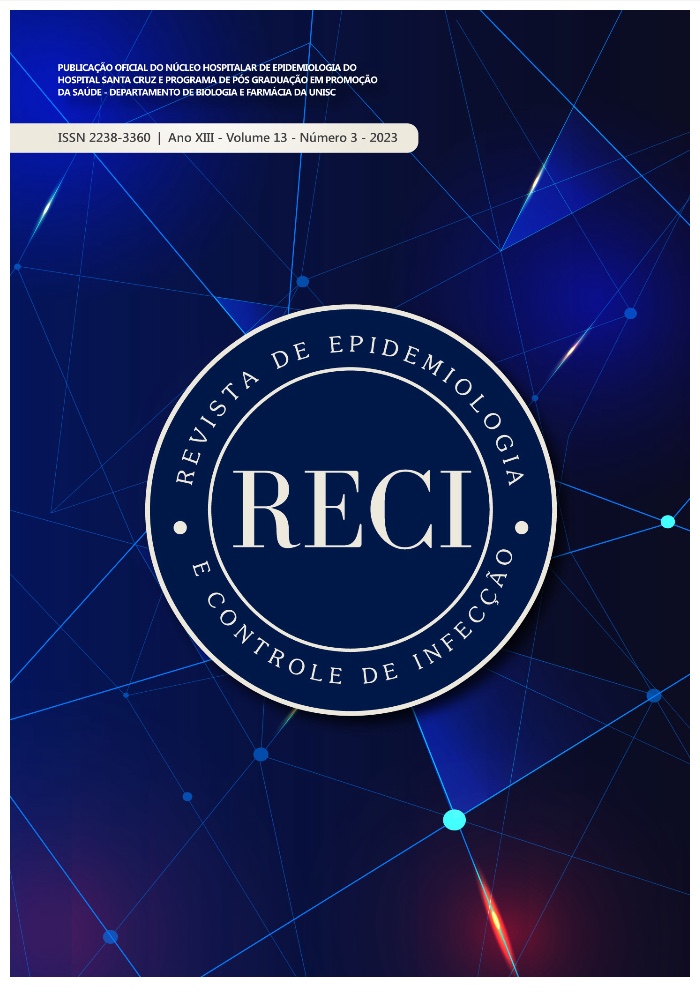Analysis of theses and dissertations on hand hygiene in Brazil: a bibliometric study
DOI:
https://doi.org/10.17058/reci.v13i3.18709Keywords:
Hand Disinfection, Patient Safety, Nursing, Health Education, Health PersonnelAbstract
Background and Objectives: in relation to hand hygiene, it is important to highlight the absence of documented investigations in the scientific literature that address the analysis of theses and dissertations related to this practice. This gap justifies the carrying out of this study, which aims to strengthen and expand the knowledge base related to this topic, highlighting its relevance in the areas of teaching, research, extension and innovation. The objective was to analyze theses and dissertations published in stricto sensu graduate programs on hand hygiene practices in Brazil. Methods: this is a bibliometric study conducted in the Coordination for the Improvement of Higher Education Personnel Theesis and Dissertation Catalog, considering the period from 2013 to 2022. Results: thirty-one (100%) studies were included, 21 (67.7%) dissertations and six (19.3%) theses. Nursing was the main area of assessment (65.6%), which mainly analyzed adherence to hand hygiene practices (29.0%), health education (12.9%), and carried out microbiological analysis of hands (12.9%). Only three publications used theoretical bases as the central core of the research. Conclusion: this study allowed us to identify the need to study the topic at doctoral level, using theoretical bases that will provide the conceptual and philosophical foundation for clinical practice.
Downloads
References
Hillier MD. Using effective hand hygiene practice to prevent and control infection. Nurs Stand. 2020; 35(5):45-50. https://doi.org/10.7748/ns.2020.e11552
Cawthorne KR, Cooke RPD. Innovative technologies for hand hygiene monitoring are urgently needed in the fight against COVID-19. J Hosp Infect. 2020; 105(2):362-363. https://doi.org/10.1016/j.jhin.2020.04.005
Chang NC, Jones M, Reisinger HS, et al. Hand hygiene and the sequence of patient care. Infect Control Hosp Epidemiol. 2022; 43(2):218-223. https://doi.org/10.1017/ice.2021.82
Oliveira ES, Cardoso MVLML, Bezerra CM, et al. Taxa de higienização das mãos em uma Unidade de Terapia Intensiva Neonatal. Acta paul enferm. 2022; 35:eAPE00497. https://doi.org/10.37689/acta-ape/2022AO00497
Glowicz JB, Landon E, Sickbert-Bennett EE, Aiello AE, deKay K, Hoffmann KK, et al. SHEA/IDSA/APIC Practice Recommendation: Strategies to prevent healthcare-associated infections through hand hygiene: 2022 Update. Infect Control Hosp Epidemiol. 2023 Mar;44(3):355-376. doi: https://doi.org/10.1017/ice.2022.304
Labrague LJ, McEnroe-Petitte DM, van de Mortel T, et al. A systematic review on hand hygiene knowledge and compliance in student nurses. Int Nurs Rev. 2018; 65(3):336-48. https://doi.org/10.1111/inr.12410
Santos C, Brandão E, Ortiz-Sanchez M, et al. Estratégias para a adesão à higienização das mãos. Rev Enf UFPE on line. 2019; 13(3): 763-72. https://periodicos.ufpe.br/revistas/revistaenfermagem/article/view/238374
Freitas MFQ de, Souza J. Pensar a formação e a pesquisa na pós-graduação stricto sensu. Educ rev . 2018; 34(71):9-18. https://doi.org/10.1590/0104-4060.62549
Guimarães AJR, Bezerra CA. Gestão de dados: uma abordagem bibliométrica. Perspect ciênc inf. 2019; 24(4):171–86. https://doi.org/10.1590/1981-5344/4192
Pulzi Júnior SA, Araujo CAS, Ferreira da Silva M. Leadership to promote patient safety culture in public hospitals managed by social health organizations. Leadersh Health Serv (Bradf Engl). 2023. doi: https://doi.org/10.1108/LHS-03-2023-0017
Almeida ARLP, Oliveira FA, Marinho CLA, et al. Enfermagem em cuidados paliativos nas dissertações e teses no Brasil: um estudo bibliométrico. Rev Min Enferm. 2019; 23:e-1188. http://dx.doi.org/10.5935/1415-2762.20190036
Coordenação de Aperfeiçoamento de Pessoal de Ensino Superior. Mapa da Pós-Graduação no Brasil 2021. GEOCAPS. https://geocapes.capes.gov.br/geocapes/
Ferreira de Oliveira BK, Arouca da Silva M, Carvalho A da S, et al. Segurança do paciente em unidade de terapia intensiva: estudo bibliométrico. REAEnf. 2020; 3:e2724. https://doi.org/10.25248/reaenf.e2724.2020
Galatti EL, Panzetti TMN. Patient Safety in the Surgical Center: Bibliometric Study. RSD. 2022; 11(6):e34111629265. https://doi.org/10.33448/rsd-v11i6.29265
Van NK, Li J, Reniers G, et al. Bibliometric analysis of safety culture research. Safety Science. 2018; 108:248–58. https://doi.org/10.1016/j.ssci.2017.08.011
Dabi Y, Darrigues L, Katsahian S, et al. Publication Trends in Bariatric Surgery: a Bibliometric Study. Obes Surg. 2016; 26(11):2691-99. https://doi.org/10.1007/s11695-016-2160-x
Anvisa. Programa nacional de prevenção e controle de infecções relacionadas à assistência à saúde (PNPCIRAS) 2021 a 2025. Brasília, 2021. https://www.gov.br/anvisa/pt-br/centraisdeconteudo/publicacoes/servicosdesaude/publicacoes/pnpciras_2021_2025.pdf
Fernandes AM, Bruchêz A, d’Ávila AAF, et al. Metodologia de pesquisa de dissertações sobre inovação: análise bibliométrica. Desafio Online. 2018; 6(1). https://desafioonline.ufms.br/index.php/deson/article/view/3539
Olson A, Oudshoorn A. Knowledge translation: A concept analysis. Nurs Forum. 2020;55(2):157-164. https://doi.org/10.1111/nuf.12410
Crossetti MGO, Góes MGO. Translação do conhecimento: um desafio para prática de enfermagem. Rev Gaúcha Enferm. 2017; 38:e74266. https://doi.org/10.1590/1983-1447.2017.02.74266
Alves HLC, Lima G de S, Albuquerque GA, et al. Uso das teorias de enfermagem nas teses brasileiras: estudo bibliométrico. Cogitare Enferm. 2021; 26:e71743. https://doi.org/10.5380/ce.v26i0.71743
Cardoso RB, Caldas CP, Brandão MAG, et al. Healthy aging promotion model referenced in Nola Pender’s theory. Rev Bras Enferm. 2022; 75(1):e20200373. https://doi.org/10.1590/0034-7167-2020-0373
Santos JLG, Cunha KS, Adamy EK, et al. Data analysis: comparison between the different methodological perspectives of the Grounded Theory. Rev Esc Enferm USP. 2018 ; 52:e03303. http://dx.doi.org/10.1590/S1980-220X2017021803303
Downloads
Published
How to Cite
Issue
Section
License
Copyright (c) 2023 Adriely de Abreu Varoto, Fabiana Guerra Pimenta, Anna Klara Sá Teles Rocha Alves, Hoberdan Oliveira Pereira, Andre Luiz Silva Alvim

This work is licensed under a Creative Commons Attribution 4.0 International License.
The author must state that the paper is original (has not been published previously), not infringing any copyright or other ownership right involving third parties. Once the paper is submitted, the Journal reserves the right to make normative changes, such as spelling and grammar, in order to maintain the language standard, but respecting the author’s style. The published papers become ownership of RECI, considering that all the opinions expressed by the authors are their responsibility. Because we are an open access journal, we allow free use of articles in educational and scientific applications provided the source is cited under the Creative Commons CC-BY license.


